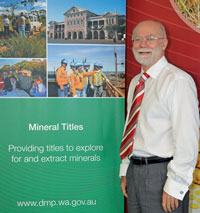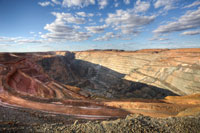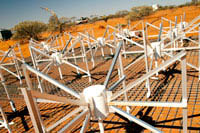Mineral Titles e-Newsletter - Department of Mines and Petroleum
Edition 1 - 14 December 2012
Edition 1 - 14 December 2012

Dr Ivor Roberts
A key role of the Department of Mines and Petroleum is to provide titles to explore for and extract minerals. This service is provided by the Mineral Titles division.
This bi-annual e-Newsletter provides tenement holders and other stakeholders with the department's latest Mineral Titles news, updates and initiatives.
In recent times there have been numerous changes to Mineral Titles processes, procedures and legislation. These have included the commencement of the State's Offshore Minerals Act and Regulations, and numerous improvements in processes and approval times for applications and dealings.
Of greatest significance has been amendments to the Mining Act 1978 which have permitted lodgement of tenement applications, documents and forms at any of our ten offices located throughout the State or online. This has significantly assisted industry and is just one of many examples where the Department of Mines and Petroleum is endeavouring to improve our services to industry.
Currently the number of granted tenements in the State is 23,561 – an all-time record. In addition, the number of pending applications has reduced to 5,829. Although this number may appear to be high, it is a significant reduction to the more than 17,000 pending applications reached in 2007.
It is our aim that the Mineral Titles division will continue to reduce these outstanding tenement applications, and with this in mind, the division appreciates the actions of applicants to participate in the Native Title process to facilitate the grant of their tenements.
The Mineral Titles division is committed to improving its services and is continuing its program to make the lodgement of all forms by licence and lease holders available online.
If you would not like to receive future editions of this e-Newsletter, you can unsubscribe at www.dmp.wa.gov.au/subscriptions.
Dr Ivor Roberts

A number of amendments to the Mining Act 1978 have recently progressed through the Parliamentary process during 2012 via Mining Amendment Bill 2012. It is intended that the Amendment Bill and Regulations will commence before the end of January, 2013. Amendments include the following:-
Also included is a provision that there will no longer be a need to compulsory surrender if the exploration licence has retention status.
NB: The extension of time provisions do not apply to statutory tenement or other expiry dates.

Changes to the Mining Regulations 1981 have recently occurred (10 November 2012) and include the following:-
Access to ‘Application Advertising’ is free.
Annual Rent and Fee Increases
Rent and fee increases in Schedule 2 of the Mining Regulation 1981 were increased from 1 July 2012 by 2.8%. The 2.8% is in accordance with the State Government’s budgetary measures to increase mining tenement rents and associated fees by the Perth 2011 September quarter CPI measurement. Amounts have been rounded off to the nearest 5c.
Rents which are payable on an anniversary date occurring prior to 1 July 2012, but paid later within the one month grace period provided in the regulations, will be at the rate that existed prior to the increase.
Information pamphlets containing the new rents and fees are available in hard copy and viewable on the department’s website.

A key role of the Mineral Titles division is to provide an efficient and timely mining title approvals process to encourage exploration for the State’s potential mineral deposits and, where found, facilitate their development.
It was identified by the Technical Taskforce, established by the Government in 2001, that the procedural requirements of the Native Title Act 1993 contributed significantly to the delay in determining mineral titles. At the time the taskforce was established, in excess of 11,000 applications for mineral titles were outstanding. The backlog of outstanding applications for mineral titles peaked by the end of 2007, with 17,315 applications in the backlog, primarily due to the ‘reversion’ initiative introduced by Mining Amendment Act 2004.
Through the reversion scheme and other statutory reform, the implementation of government policy, streamlining administrative procedures and enhancements of business systems, the division has managed to reduce the number of outstanding applications for mineral titles to less than 6,000.
Ongoing initiatives have been implemented to further address the large number of pending applications. Unresolved applications effectively sterilises access to land for mineral exploration and development purposes.
Consistent with its commitment to transparency, the Mineral Titles division approval timeline performance measures are included in the department’s approvals performance reports that are published quarterly and available on the department website.

In 2010 an updated policy was introduced to better manage the requirement to survey leases. Following the 2006 Act amendments, a lease application lodged after that time can only be granted on the basis of a mining proposal or mineralisation report which must accompany the application. Grant of a lease will therefore initiate a direction to survey.
From 1 November 2010, the Mineral Titles division introduced a program to clear the backlog of leases requiring survey, a process estimated to take approximately six years to complete, commencing from the oldest granted lease. In 2010, there were 2,511 granted mining leases and 365 granted general purpose leases that remained unsurveyed.
In some circumstances the Mineral Titles division may recommend that other leases in close proximity to those directed to be surveyed also be surveyed, as a means of reducing the mobilisation cost of survey.
To date approximately 575 leases have now had survey instructions issued (surveys completed or in progress) and it is estimated there is only approximately 100 leases that remain unsurveyed which are older than 21 years. Clearing the backlog of old granted leases is on track to be completed within the estimated six year period.
This change in survey policy has been well received by the mining industry. There has been wide acknowledgement both of the requirement and the positives for this change in policy namely:

The Western Australian government is a principal collaborator in the Australian–New Zealand implementation of the Square Kilometre Array (SKA) International Radio Astronomy Project.
The SKA will address important questions regarding the physical nature of the Universe and the laws that govern it, and will place its host at the forefront of global radioastronomy research.
The Minister for Mines and Petroleum and the department have assisted to ensure a radio-quiet zone is established around the SKA through two initiatives:
The department is working closely with project partners to ensure compliance with the tenement conditions is not unnecessarily obstructive or expensive. This collaboration is progressing and it is intended industry groups will be consulted to gain their input to continue to improve the processes.

In March 2012 the Mineral Titles division engaged the services of external native title specialists as part of a team focussed on reducing the outstanding number of mineral title applications stalled in the right to negotiate regime of the Native Title Act 1993 (Cwth) future act processes.
Of the 6,922 applications for mineral titles that were outstanding at the end of 2011 there were 2,369 applications that were lodged prior to 1 January 2009.
Approximately 35 per cent of the outstanding applications were in excess of two years old. The majority were languishing in the future act right to negotiate process of the Native Title Act.
Our specialist team identified some 550 mining lease applications in its first phase of the project that:
As part of its strategy to resolve the slow progress of these applications, the Project Team is utilising the mediation services of the National Native Title Tribunal. The team will ensure that the mining lease applications are progressed appropriately by:
A comprehensive consultation with industry peak bodies, Aboriginal representative bodies and the National Native Title Tribunal was undertaken as part of the project.
Since the commencement of the project in March 2012 the number of applications lodged before 1 January 2009 and remaining outstanding has been reduced by 60 per cent to 1,416, representing 24 per cent of the 5,769 mineral title applications currently outstanding. The Mineral Titles project team is focused on progressing the remaining long outstanding mineral title applications and reduce the time taken for mineral titles to be granted.
The Mineral Titles division is confident that measurable targets of a 30 per cent reduction of this backlog will be met by the end of 2012. Formal negotiation training has been undertaken by project officers and with the assistance of senior project officers in a new structure currently being developed, project teams pro-actively engage in the right to negotiate process as an active party to the proceedings.
In due course other outstanding tenement applications within the right to negotiate such as exploration licences that may have lost an expedited procedure objection will also be targeted for proactive engagement towards a determination.
The department project officers undertake an important role in representing the State as a party to proceedings in the right to negotiate process and as such will be actively progressing matters and opposing lengthy delays and adjournments.
This positive and proactive participation by the Mineral Titles division will help ensure the department meets its key role in providing an efficient and timely mining title approvals system, thereby aiding the sustainability of the resources sector and the State's future prosperity.
The Mineral Titles division has been providing the land approvals and Native Title unit of the Department of Premier and Cabinet and the State Solicitor's Office with current and historical mining tenure information to support the State in negotiation, mediation and litigation of Native Title claims.
This has been an ongoing process since the introduction of the Native Title Act, 19 years ago. For this project, seven the Mineral Titles division staff are funded by the Department of Premier and Cabinet to conduct historical research and capture of mining tenure on Native Title Claims prioritised by land approvals and the Native Title unit.
The mining tenure provided is combined with land tenure compiled by the Native Title Spatial Services unit of Landgate to form a GIS package for use in the determination of Native Title claims.
The Mineral Titles division has recently completed tenure for Badimia and Njamal and is current fully engaged on the Ngadju Native Title claim.
The historical tenure is being captured in the department's Tengraph and eMiTs systems which will allow all historic granted mining titles throughout the State to be captured, making the provision of this data a much simpler process.

Kalgoorlie Regional Mining Registrar, Ross Collins retired from service as of 27 July 2012. Ross is the longest serving Mining Registrar in Kalgoorlie, being appointed in 1981.
Helen Mitchell, Mining Registrar at Marble Bar, retired on 25 October 2012 after 24 years with the department. Helen started with the department on 17 February 1988. She took on the role of Mining Registrar in July 1996 and has occupied that position since.
The Government has committed $1.33 million from the 2012-13 State budget to building a new Mining Registrar office in Mount Magnet.
The core function of the office will be to accommodate the Mining Registrar Mount Magnet, providing the local community with mineral title services including the assessment and approval of Miner's Rights, special Prospecting Licences for Gold and mining tenements in general.
The increased office space will enable our regional staff to also continue to provide other government services such as licensing functions on behalf of the Department of Transport and court administration functions on behalf of the Department of the Attorney General. The regional staff also carry on functions for the Western Australian Electoral Commission and the Department of Racing, Gaming and Liquor.
The existing Mining Registrar office in Mount Magnet was vacated some time ago as a precautionary step to address concerns about the declining condition of the building. Mining Registrar services continue to be provided temporarily from the Mount Magnet Rural Transaction Centre until the construction of the new building is completed, scheduled for January 2013.